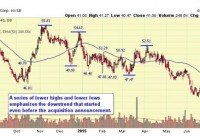Black Hills Corporation: A Stability And Growth 2-For-1
Black Hills Corporation’s shares have become undervalued as a result of its oil and gas exposure. A healthy dividend yield and stable diversified cash flow streams make the Company an excellent anchor for investors. The oil and gas business segment is a free call option if the industry recovers. For a mixture of stability and growth, investors should snap up Black Hills’s shares. Utilities companies are some of the most stable companies in existence due to their inelastic consumer demands. Even during economic downturns, consumers will not save money by cutting off their water or heat; they will save money through other means. As a result, the cash flow is always running high for utilities companies, and by the same token, investors can always depend on a steady cash flow (in most instances). Utilities companies are what we might consider as defensible investments, in which investors invest in them to “defend” their investments against loss during economic downturns. However, as investors know, small cap companies offer investors higher-than-expected growth when compared against the S&P 500 and other similar market-wide indices. This is because small cap companies have more room to grow than their large cap counterparts. As such, investors’ capital has more room to grow with the growth of the small cap firms. Thus, when investors combine small cap growth with the stability of utilities companies, they get a hybrid small cap utilities company that can offer the best of both worlds: a medium to low-risk, medium-reward investment that can both generate capital appreciation with the added benefit of capital preservation and a steady quarterly paycheck that the company puts in your bank account. One small cap utilities firm, Black Hills Corporation (NYSE: BKH ), offers this opportunity for investors to simultaneously benefit from capital appreciation and capital preservation. Black Hills Corporation is a diversified utilities company that runs a variety of regulated electric and gas utilities subsidiaries. The Company serves customers in the Midwest and Rocky Mountain states, so the Company is specialized in a certain region. Black Hills Corporation’s business segments can be divided into three main segments: Power Generation, Coal Mining, and Oil & Gas. The Company has both cash cow businesses and high growth businesses, which is always a great way for investors to get in on that stable cash flow and share value growth. From just the stock chart, investors can see that the Company has returned a healthy return to investors: capital invested in the Company at the onset of 2011 has generated a return on investment of about 75%. Keep in mind that this number does not include dividends that the Company generates for shareholders. With a dividend yield of about 3%, the dividends add a substantial amount of return on top of the pure capital appreciation return. While it appears that the stock price has begun to stagnate and even slowly slip, that is more of a result of macro conditions than anything else-it is not Company-specific. Furthermore, the Company has oil and gas exposure, which has resulted in the Company feeling some of the pain from the collapse of oil prices a few years back. However, because the Company is diversified in several sub-industries, the Company has only suffered a little. From a technical perspective, the 50-day moving average has swung alongside the 200-day moving average for quite some time-the two continuously move back and forth. Most recently, the 50-day moving average has been below its bigger brother, but it appears that the spread between these two indicators is closing, which could indicate near-term upside. (click to enlarge) Source: Stockcharts.com From a fundamental perspective, what investors are looking at is an undervalued, cash-flow generating Company that has suffered from the setbacks in the oil and gas industries. Black Hills Corporation has its hands in a variety of submarkets within the utilities industry, including oil and gas, coal, electricity, and some other markets. The cash cow generating businesses include its Power Generation and Coal Mining businesses. These businesses provide ample cash flow for the Company to inject back into the Company for further growth and for the Company to return to shareholders as dividends. The fast growth segment is the Oil & Gas segment, which has been dealt a blow as a result of the collapse of oil prices. However, it is this segment that essentially gives the shares a free call option. This segment is subject to the volatility seen in the larger oil and gas industry, and this can be viewed as a negative. At the same time, it is important to remember that this greater volatility can swing the shares in the positive direction as well. Thus, Black Hills Corporation has a number of aspects that investors will find favorable. A strong dividend yield, excellent stable cash flows from diversified business segments, and a free call option in case the oil and gas industry recovers (which it probably will-the question is more when than if it will) all make the Company an excellent investment for long-term investors.
